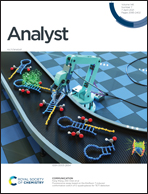Fluorescence sensing of cyanide anions based on Au-modified upconversion nanoassemblies†
Abstract
Cyanides have been recognized as one of the most toxic chemicals and are harmful to the environment and human beings. Herein, fluorescence resonance energy transfer (FRET)-based upconversion nanoprobes for cyanide anions have been designed and prepared by assembling Au nanoparticles (NPs) on core–shell-structured NaYF4:Yb,Er@NaYF4:Yb upconversion NPs (csUCNPs), where csUCNPs act as the energy donor and Au NPs act as the energy acceptor. The Au content was optimized in order to have a large quenching efficiency in upconversion luminescence (UCL). The cyanide-mediated redox reaction leads to the consumption of Au NPs, resulting in UCL recovery by the inhibition of the FRET process. On the basis of these features, csUCNP/Au nanoassemblies can serve as sensitive nanoprobes for cyanide ions with a detection limit of 1.53 μM. Moreover, no significant UCL variation was observed upon the addition of other interfering ions, showing the excellent selectivity of nanoprobes toward cyanide ion sensing. The easy preparation of such upconversion-based nanoprobes provides a promising platform for sensitive and selective sensing of other hazardous species.



 Please wait while we load your content...
Please wait while we load your content...